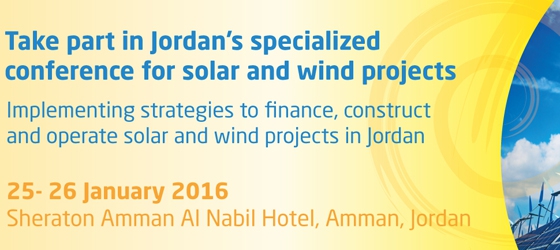The Solar & Wind Projects Jordan Conference is just around the comer. In anticipation of the event, ACM Events (Advanced Conferences & Meetings FZ-LLC), the organizer of the conference, has conducted a one-to-one interview with Dr. Rasmi Hamzeh, Executive Director, Jordan Renewable Energy and Energy Efficiency Fund (JREEEF) to shed more light on the importance renewable energy holds to Jordan's future.
In this in-depth discussion, Dr. Rasmi speaks about huge potential for international companies to enter the Jordanian market due to the high demand on renewable energy equipment and systems and the challenges Jordan will have to overcome to ensure sustainability in the Kingdom.
Why in your opinion is Solar & Wind Jordan an event not to miss?
Jordan has a variety of opportunities for foreign investors interested in electricity generation ventures. There is a huge potential for international companies to enter the Jordanian market.
There is very good demand for wind energy equipment, solar power units and waste-to-energy systems which can be capitalized by technology providers and investment groups.
Furthermore, having a developed electricity grid, strong legal and intellectual property protections, a market-friendly economy and a skilled workforce makes Jordan an attractive market for renewable energy.
Wind; Jordan has a good potential in wind energy resources, which could also be exploited in the short to medium term, due to relatively low investment costs.
As a lower estimate, 600 MW of wind is planned to be developed until 2020, generating 1,577 GWh.4 As an upper estimate, the Government aims at developing wind with a total installed capacity of 1000-1250 MW until 2020.5 However, serious grid capacity limits are a barrier to such a speedy development (see Section on grid limits for more details).
Solar; The solar energy potential in Jordan is large, due to Jordan’s favorable location. Jordan lies within the so-called solar belt receiving a daily average of solar radiation ranging between 5 and 7 kWh/m2, which implies a potential annual.
What are the challenges Jordan will have to overcome to ensure sustainability in the Kingdom?
To spur new investments and help streamline the process, Jordan passed legislation in 2012 (Renewable Energy and Energy Efficiency (REEE) Law) that obligates the Jordanian National Electric Power Company to purchase all electricity produced by renewable energy plants and to establish fixed electricity tariffs for each new facility. The law provides investors with many incentives including 75% exemption from the income tax for 10 years.
As well as, The government has established a new Jordanian Renewable Energy and Energy Efficiency Fund (“JREEF”) to support new renewable energy projects covering all sectors on small scale, like households, SME’s, Schools, …etc. In addition, a new Renewable Energy and Energy Efficiency Law provides investors with certain tax incentives, including customs and sales tax exemptions.
ifpinfo
11 January






















































